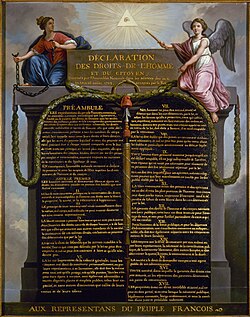
Back Liberalisme Afrikaans Liberalismus ALS ለዘብተኝነት Amharic Liberalismo AN Frēodōmes þōht ANG ليبرالية Arabic ليبيرالية ARY ليبراليه ARZ উদাৰনৈতিকতাবাদ Assamese Lliberalismu AST
| Liberalismo | ||
|---|---|---|

| ||
| politika filozofio politika ideologio | ||

Liberalismo estas politika filozofio aŭ mondrigardo konstruita en ideoj de libereco kaj egaleco.[1] Liberaluloj apogas larĝan aron de vidpunktoj depende de sia kompreno de tiuj principoj, sed ĝenerale ili apogas ideojn kiel ekzemple liberaj kaj justaj balotadoj, civitanrajtoj, gazetara libereco, religia libereco, libera komerco, kaj privata posedrajto.
Liberalismo unue iĝis klara politika movado dum la Klerismo, kiam ĝi iĝis populara inter filozofoj kaj ekonomikistoj en la okcidenta mondo. Liberalismo malaprobis heredajn privilegiojn, ŝtatan religion, absolutan monarkion kaj la Didevena Rajto de Reĝoj. La filozofo John Locke de la 17-a jarcento ofte estas meritigita pro fondado de liberalismo kiel klara filozofia tradicio. Locke argumentis ke ĉiu homo havas naturon rekte al vivo, libereco kaj posedrajto[2][3][4][5][6][7] kaj laŭ la socia kontrakto, registaroj ne rajtas malobservi tiujn rajtojn.
Liberaluloj kontraŭbatalis tradician konservativismon kaj serĉis anstataŭigi absolutismon en registaroj per reprezenta demokratio kaj la jura hegemonio (Egaleco antaŭ la leĝo kaj Jurecebleco).
La revoluciuloj de la Glora Revolucio, Usona Revolucio, segmentoj de la Franca Revolucio (kiel ekzemple la Deklaracio pri Homaj kaj Civitanaj Rajtoj), kaj aliaj liberalaj revoluciuloj de tiu tempo uzis liberalan filozofion por pravigi la armitan forigon de tio kion ili vidis kiel tirana reĝimo. Dum la deknaŭa jarcento liberalaj registaroj establiĝis en landoj en tuta Eŭropo, Hispanameriko, kaj Nordameriko.[8] En tiu periodo, la domina ideologia kontraŭulo de liberalismo estis klasika konservativismo.
Dum la 20a jarcento, liberalaj ideoj disvastiĝis eĉ plu, ĉar liberalaj demokratioj trovis sin sur la venka flanko en ambaŭ mondmilitoj. Liberalismo survivis ankaŭ al ĉefaj ideologiaj defioj el novaj opoziciantoj, kiaj faŝismo kaj komunismo. En Eŭropo kaj Nordameriko, ekzistis ankaŭ la pliiĝo de sociala liberalismo [9][10], kiu estas rilata kun socialdemokratio en Eŭropo. La signifo de la vorto "liberalismo" komencis diverĝi en diversaj mondopartoj, do pli for el la okcidenta mondo.

Klasika liberalismo estas termino fabrikita de libertarianismaj politikaj teoriistoj je la 20-a jarcento por distingi inter ilia ideologio kaj tiu de 20-aj jarcentaj liberaluloj kaj signifi ke libertarianismo, ne liberalismo, estas fidela al historia liberala pensado. Ĝi sekvas tradicion de pensado de John Locke al Adam Smith al Frédéric Bastiat al Ludwig von Mises al Friedrich August von Hayek al Anthony de Jasay, de filozofoj, ekonomikistoj, kaj politikaj pensuloj, kiuj studigas kaj antaŭenigas individuan liberecon, notinde kontraŭ la arbitra povo de registaroj. Vidu artikolon Libertarianismo.
- ↑ Russell 2000, paĝoj 577–8; Young 2002, p. 39.
- ↑ "All mankind...being all equal and independent, no one ought to harm another in his life, health, liberty, or possessions", John Locke, Second Treatise of Government
- ↑ Kathleen G. Donohue. (2003-12-19) Freedom from Want: American Liberalism and the Idea of the Consumer (New Studies in American Intellectual and Cultural History). Johns Hopkins University Press. ISBN 9780801874260. “Three of them - freedom from fear, freedom of speech, and freedom of religion - have long been fundamental to liberalism.”.
- ↑ (1996) The Economist, Volume 341, Issues 7995-7997. The Economist. “For all three share a belief in the liberal society as defined above: a society that provides constitutional government (rule by laws, not by men) and freedom of religion, thought, expression and economic interaction; a society in which ...”.
- ↑ Sehldon S. Wolin. (2004) Politics and Vision: Continuity and Innovation in Western Political Thought. Princeton University Press. ISBN 9780691119779. “While liberalism practically disappeared as a publicly professed ideology, it retained a virtual monopoly in the ... The most frequently cited rights included freedom of speech, press, assembly, religion, property, and procedural rights”.
- ↑ Edwin Brown Firmage, Bernard G. Weiss, John Woodland Welch. (1990) Religion and Law: Biblical-Judaic and Islamic Perspectives. Eisenbrauns. ISBN 9780931464393. “There is no need to expound here the foundations and principles of modern liberalism, which emphasises the values of freedom of conscience and freedom of religion”.
- ↑ John Joseph Lalor. (1883) Cyclopædia of Political Science, Political Economy, and of the Political History of the United States. Nabu Press. “Democracy attaches itself to a form of government: liberalism, to liberty and guarantees of liberty. The two may agree; they are not contradictory, but they are neither identical, nor necessarily connected. In the moral order, liberalism is the liberty to think, recognised and practiced. This is primordial liberalism, as the liberty to think is itself the first and noblest of liberties. Man would not be free in any degree or in any sphere of action, if he were not a thinking being endowed with consciousness. The freedom of worship, the freedom of education, and the freedom of the press are derived the most directly from the freedom to think.”.
- ↑ [1]
- ↑ Ofte menciita simple kiel "liberalismo" en Usono.
- ↑ Liberalism in America: A Note for Europeans de Arthur Schlesinger Jr. (1956) el: The Politics of Hope (Boston: Riverside Press, 1962).

„ Liberalism in the U.S. usage has little in common with the word as used in the politics of any other country, save possibly Britain. ”

